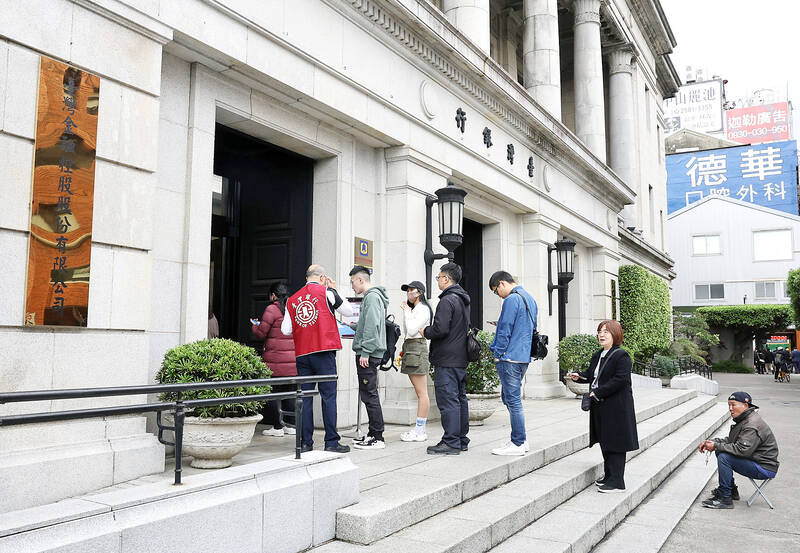Bank of Taiwan (台灣銀行), the largest lender in the country, is scheduled to open a representative office in Fukuoka, Japan, on March 22 at a time when the Taiwanese semiconductor industry is extending its reach into the Japanese market, led by contract chipmaker Taiwan Semiconductor Manufacturing Co (TSMC, 台積電).
Speaking with reporters, Bank of Taiwan chairman Lyu Jye-cherng (呂桔誠) said the bank has been a major supporter of the local semiconductor industry and is determined to follow the
industry’s move by making its presence felt in the Japanese market by providing one-stop shopping services to Taiwanese IC suppliers.

Photo: CNA
Bank of Taiwan would be able to integrate its strength in domestic business units (DBUs) and offshore business units (OBUs) along with its branches internationally to provide the best possible services to Taiwan’s high-tech sector in foreign markets, Lyu said.
To develop a better understanding of Japan’s economic and industrial development, the bank decided to open a representative office in Fukuoka with an application approved by the Financial Supervisory Commission (FSC) in early December.
Bank of Taiwan has forged close business ties with major Japanese banks, such as Sumitomo Mitsui Banking Corp, Mizuho Bank and Mitsubishi UFJ Financial Group Inc, so the Taiwanese bank would be able to provide better services through such cooperation in Japan, Lyu added.
Bank of Taiwan already has a branch in Tokyo and operates branches in 10 other cities internationally: New York, Los Angeles, Hong Kong, Singapore, London, Shanghai, Guangzhou, Fuzhou, Sydney and Johannesburg.
In addition, Bank of Taiwan has representative offices in 10 cities including Mumbai, Yangon, Ho Chi Minh City, Bangkok and Phoenix, Arizona, where TSMC is building two advanced wafer fabs.
In Japan, the first TSMC wafer fab in Kumamoto is scheduled to begin operations on Sunday next week.
On Tuesday last week, TSMC, the world’s largest contract chipmaker, announced it would build a second wafer fab in Kumamoto — Japan Advanced Semiconductor Manufacturing (JASM) — through a joint venture with its Japanese partners.
The second fab is expected to break ground at the end of this year, with operations slated to begin at the end of 2027.
Together with JASM’s first fab, the overall investment of JASM would exceed US$20 billion, TSMC has said.
Led by TSMC, its suppliers are investing in Japan, which has prompted more Taiwanese banks to set their sights on the Japanese market, the FSC said.
On Feb. 6, the FSC approved an application from Bank of Taiwan to set up a branch in Tokyo.
The FSC said that in addition to Bank of Taiwan, First Commercial Bank, Chang Hwa Commercial Bank, Mega International Commercial Bank, Taiwan Business Bank, E.Sun Commercial Bank, Taishin International Bank and CTBC Bank also operate branches in Japan.

CHIP RACE: Three years of overbroad export controls drove foreign competitors to pursue their own AI chips, and ‘cost US taxpayers billions of dollars,’ Nvidia said China has figured out the US strategy for allowing it to buy Nvidia Corp’s H200s and is rejecting the artificial intelligence (AI) chip in favor of domestically developed semiconductors, White House AI adviser David Sacks said, citing news reports. US President Donald Trump on Monday said that he would allow shipments of Nvidia’s H200 chips to China, part of an administration effort backed by Sacks to challenge Chinese tech champions such as Huawei Technologies Co (華為) by bringing US competition to their home market. On Friday, Sacks signaled that he was uncertain about whether that approach would work. “They’re rejecting our chips,” Sacks

NATIONAL SECURITY: Intel’s testing of ACM tools despite US government control ‘highlights egregious gaps in US technology protection policies,’ a former official said Chipmaker Intel Corp has tested chipmaking tools this year from a toolmaker with deep roots in China and two overseas units that were targeted by US sanctions, according to two sources with direct knowledge of the matter. Intel, which fended off calls for its CEO’s resignation from US President Donald Trump in August over his alleged ties to China, got the tools from ACM Research Inc, a Fremont, California-based producer of chipmaking equipment. Two of ACM’s units, based in Shanghai and South Korea, were among a number of firms barred last year from receiving US technology over claims they have

BARRIERS: Gudeng’s chairman said it was unlikely that the US could replicate Taiwan’s science parks in Arizona, given its strict immigration policies and cultural differences Gudeng Precision Industrial Co (家登), which supplies wafer pods to the world’s major semiconductor firms, yesterday said it is in no rush to set up production in the US due to high costs. The company supplies its customers through a warehouse in Arizona jointly operated by TSS Holdings Ltd (德鑫控股), a joint holding of Gudeng and 17 Taiwanese firms in the semiconductor supply chain, including specialty plastic compounds producer Nytex Composites Co (耐特) and automated material handling system supplier Symtek Automation Asia Co (迅得). While the company has long been exploring the feasibility of setting up production in the US to address

OPTION: Uber said it could provide higher pay for batch trips, if incentives for batching is not removed entirely, as the latter would force it to pass on the costs to consumers Uber Technologies Inc yesterday warned that proposed restrictions on batching orders and minimum wages could prompt a NT$20 delivery fee increase in Taiwan, as lower efficiency would drive up costs. Uber CEO Dara Khosrowshahi made the remarks yesterday during his visit to Taiwan. He is on a multileg trip to the region, which includes stops in South Korea and Japan. His visit coincided the release last month of the Ministry of Labor’s draft bill on the delivery sector, which aims to safeguard delivery workers’ rights and improve their welfare. The ministry set the minimum pay for local food delivery drivers at